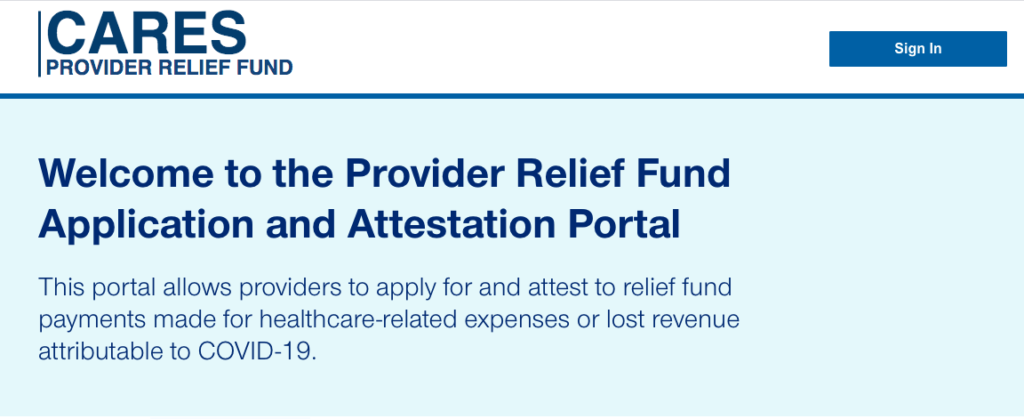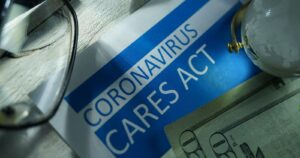On October 1st, 2020, the Department of Health and Human Services (HHS) announced a new $20 Billion in funding for healthcare providers at the frontier of the fight against the COVID pandemic. This is being referred to as Provider Relief Fund Phase 3.
Provider Relief Funds
To recap, healthcare entities have seen two other phases of the Provider Relief Fund:
Phase 1 Provider Relief Fund
The CARES Act, which was the $2 Trillion Stimulus package passed in March 2020, allocated $30 Billion to HHS to aid the hundreds of thousands of medical practices struggling due to COVID-related closures and loss of patient volume.
This was an automatic grant that went out to most practices and healthcare organizations that take Medicare.
It was commensurate with about 6.25% of the practice’s 2019 Medicare revenue.
Phase 2 Provider Relief Fund
In late April, HHS announced another tranche of $20 Billion to healthcare providers. This portion required an online application from requesting practices.
Together, the Phase 1 and 2 Provider Relief Funds (PRF) were referred to as the “General Distribution”. They were attempting to get people about 2% of their net Medicare revenue from 2018, from the General Distribution.
And now, we come to the newly released Phase 3 General Distribution
Phase 3 Provider Relief Fund
The purpose of this new allocation of funds is to aid healthcare providers as they see COVID-related loss of revenue and increased expenses.
Like previous PRF, this is a grant, not a loan that is expected to be repaid.
Eligibility for Phase 3 Provider Relief fund
The following are eligible for Phase 3:
- Practices that have previously received Phases 1 and 2 of Provider Relief Funds
- Previously ineligible newly formed practices, that have gone into business from January 1- March 31, 2020
- An expanded number of mental health professionals are included due to a rapid rise in mental health problems such as anxiety and depression during the pandemic.
Providers may be eligible whether or not they previously applied or, or received, or rejected prior HHS Grants.
Eligible providers are those who:
- Accepted Medicare Fee-for-Service payments between January 1, 2019- March 31, 2020
- Billed Medicaid/Medicaid Managed Plans/CHIP programs between January 1, 2018- March 31, 2020 (This is great- since physicians who bill Medicaid were left out of the previous phases of the General Distribution, such a sour pediatrician colleagues).
- Be a behavioral health provider who does or does not accept insurance for patient care, as of March 31, 2020
- Dental service provider who does or does not bill private insurance companies for patient care, as of March 31, 2020
Additional Eligibility Requirements
Applicants must meet all of the following criteria:
- File Federal Tax Returns for tax years 2017, 2018 and 2019, if in business before 2020, or be exempt from needing to file
- Have provided patient care after January 31, 2020
- Did not permanently stop providing patient care directly or indirectly
- For individual providers, have evidence of gross receipts on IRS Form 1040 or other.
Amount of Distribution
The formula upon which Phase 3 distribution will be based is not clear yet.
All applications will first be reviewed to make sure they have received 2% of their annual patient-related revenue from prior Distributions.
If some have not, they will first receive an amount so the sum of their Provider Relief Fund distributions, in all, amounts to 2% of revenue.
Any remaining funds will then be allocated equitably among applicants, based on losses incurred due to the pandemic as well as increased expenses of patient care.
Application Timeline
Applications opened up at the start of this week, on October 5, 2020. It runs till November 6, 2020.
HHS is urging everyone to apply as soon as possible since they can start reviewing applications and dole out funds only after everyone’s applications are in.
Application Process
To apply for funding, you need to use the Provider Relief Fund Application and Attestation Portal.

Optum ID
Since HHS is partnering with UnitedHealth Group to disburse the funds, you need to sign in or set up an Optum ID with your name and email address.
You need to sign up for updates- no unsubscribing here, your email is required.
TIN Validation
You add your organization’s Taxpayer Identification Number (TIN). Your TIN may need to be validated.
If you received prior Provider Relief Funds with the same TIN, it may already be in the system. Your TIN may also be part of state-provided third party lists.
If your TIN is not validated, it will be sent out to third party validators and this process may take up to 4 weeks.
You use the TIN with which you file taxes (since they need to verify revenue), even if it is not the TIN which directly bills Medicare/Medicaid.
The Organization TIN may have subsidiary TINs and all of those should be listed in the application.
You also certify that you are the Program Administrator or representative on behalf of your organization. This responsibility may be transferred over to someone else by calling Optum at 866-569-3522, TTY dial 711.
Details to enter:
- Name of your business
- Tax filing Classification (such as Sole Proprietorship or S- corp)
- Business Address
- Primary Service Location
- Any subsidiary TINs (if not, re-enter your TIN)
- Billing Company information, if applicable
- Applicant Type (Individual/Group)
- For a Group: Group NPI, NPI Effective Date, Medical/ Department of Health (DOH)/ License Number.
- For an individual: Date of Birth, Individual NPI, Social Security Number (if there is no NPI), Medical/DOH/License Number
Confirm Revenue and Tax Information
You need to provide required revenue and tax information through the portal.
To do so, you are first directed to an Authentication page where you enter the access code that was sent to your your email.
The email will come from HRSA CARES Act Provider Relief via DocuSign with the subject line: “Email Validation: CARES Act Provider Relief Fund”.
- You will need to submit Federal Income Tax Returns for years 2017-2019
- Gross Revenue Worksheet
- Operating revenue and expenses from patient care
You do have to resubmit some of the same financial information you may have submitted for earlier distributions.
Payment Types
You may receive the funds either by ACH transfer to your bank account or paper check. The payment will be from Optum Bank with “HHS.GOV” as the payment description.
Payment Attestation
Once you receive the funds, you sign an attestation to confirm receipt of funds and agree to the Terms and Conditions within 90 days.
You are allowed to decline the funds. You indicate on the same attestation that you are declining the funds.
If you keep the funds for 90 days, it is automatically assumed that you have accepted them and agreed to the Terms and Conditions.
You can attest on the same Organization TIN Dashboard where you validated your TIN.
The “Attest to Payment and Terms” section will become available after funds are disbursed.
ACH Payment Attestation
If you received an ACH transfer, you enter your Optum ID and the amount of funds received.
The attestation page has an option to reject or accept the funds. You do not have the option to reject part of the funds. You must either accept or reject all of it.
To reject the funds, you call your bank and ask them to refuse the ACH transfer by initiating ACH return code “R23-Credit Entry Refused by Receiver”. You do not have to follow up with Optum Bank to confirm receipt of funds by them.
Your Organization TIN Dashboard will show your attestation status.
Paper Check Attestation
If you received funding by paper check, enter the check number and amount of payment.
Then you can attest to receiving or rejecting the funds, in the same way as for ACH Payment Attestation.
If you reject the funds, you may safely shred the check. If for some reason, you’ve already deposited the check and then change your mind, you can call the Provider Support Line at (866) 569-3522 to arrange a refund.
Your Organization TIN Dashboard will show the status of your attestation.
Reporting Requirements
The Terms and Conditions you agree to when you attest to the receipt of funds state the reporting requirements you need to comply with.
Additional reporting requirements may come in further directives from HHS.
Reports are meant to assess how a provider is using the grant funds.
From HHS.Gov:
“Provider Relief Fund payments may be used to cover lost revenue attributable to COVID-19 or health-related expenses purchased to prevent, prepare for, and respond to coronavirus, including but not limited to:
- Supplies
- Equipment
- Workforce training
- Reporting COVID-19 test results to federal, state, or local governments
- Building or constructing temporary structures for COVID-19 patient care or non-COVID-19 patients in a separate area
- Acquiring additional resources, including facilities, supplies, or staffing to expand or preserve care delivery
- Developing and staffing emergency operation centers
Recipients of >$10,000 will be required to submit reports about the use of their Provider Relief Fund distribution.“
Here is a summary of Reporting Requirements for recipients of Provider Relief Funds.
So this, in a nutshell, is an overview of Phase 3 General Distribution of the Provider Relief Fund from the Department of Health and Human Services.
Useful links
- HHS.Gov CARES Act Provider Relief Fund
- HHS.Gov Learn about the Provider Relief Fund
- CARES Act Provider Relief Fund Payment Portal User Guide
I hope this is helpful! Did you get funds from prior Provider Relief Fund? Are you going to apply for this Phase 3 Distribution?




